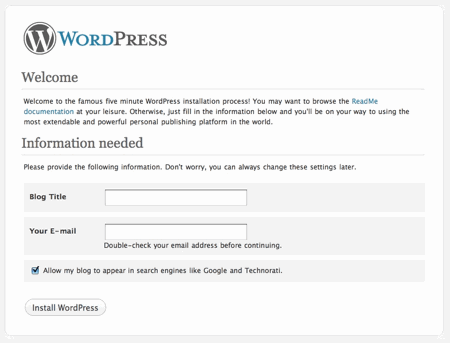
How to Start With Search Engine Optimization of a WordPress Blog?
Millions, if not billions, of webmasters use WordPress as the primary CMS for their websites. WordPress sites are easy to use and manage, look good and extremely customizable as well. Well, it must be acknowledged that this CMS does not have loads of out of the box SEO features, but there are still some things that you can follow for proper optimization of your WordPress sites:
Permalinks
This is the first thing I change after installing WordPress. By default, WordPress posts look like this: http://yourdomainname.com/?p=38. This is not good for SEO. You generally should include the keyword that you want to rank for in the URL (You should include that in your post title as well).
To change this default permalink, just go to Settings and then Permalinks. You can decide a format of your choice, but, I feel this structure works the best: /%postname%/.
Remember one thing though; this change in permalinks should only be done to a new and fresh WordPress blog. In case of existing blog, if you change the permalink all of a sudden, your blog may actually suffer instead of any improvement.
Turn on Pingbacks
Through this, you can link to other people and actually get link backs to your website. Head over to Settings->Discussion and then check the following options: “Attempt to Notify Blogs Linked to From the Article” and “Allow Link Notifications from other blogs”.
Use Alt attributes
If you add images to a WordPress post and have the primary keyword ready in your mind, you should put that keyword in the alt attributes of the uploaded and attached images for that post.
301 Redirect
To make sure that the link juice is not distributed between the non-www and www versions of your website, you should do a permanent 301 redirect. This is simple to do. If you wish to point the link juice to the non-www version, open and edit your .htaccess file (On the File manager of your hosting account, this file can be found in the folder where you installed WordPress):
# Begin 301
RewriteEngine On
RewriteCond %{HTTP_HOST} !^www\.domainname\.com [NC]
RewriteRule ^(.*)$ http://www.domainname.com/$1 [L,R=301]
# BEGIN WordPress
<IfModule mod_rewrite.c>
RewriteEngine On
RewriteBase /
RewriteCond %{REQUEST_FILENAME} !-f
RewriteCond %{REQUEST_FILENAME} !-d
RewriteRule . /index.php [L]
</IfModule>
# END WordPress
WordPress SEO Plugins
These are some of the best WordPress SEO plugins based on my knowledge:
WP SEO by Yoast: It has all the options that a WordPress SEO plugin would require: social integration, XML sitemap, RSS Optimization, Webmaster Tools Verification, Rich Snippets, On-Page Analysis etc. You can also get a snippet preview of how the webpage may actually look like in search engines.
Headspace 2: You can auto-write descriptions and titles for all your keywords, categories, posts etc. It gives you an edge with better on-page analysis. It may seem a bit tough to manage, but, once, you get the hang of it, things are nothing but cakewalk.
All in One SEO Pack: Probably, the most popular WordPress SEO plugin, you can easily specify the title, keywords and Meta description of your blog post through this plugin. Through some advanced features, you can change home title, home description and home keywords as well.
It’s always best if your post receives some social shares. For reader convenience, you can install plugins such as ShareThis or AddThis, so that, if readers like a post, they can easily share the same with their friends of different social networking sites. If the post is of good quality, you can easily get viral, thereby, inviting huge amount of traffic.

